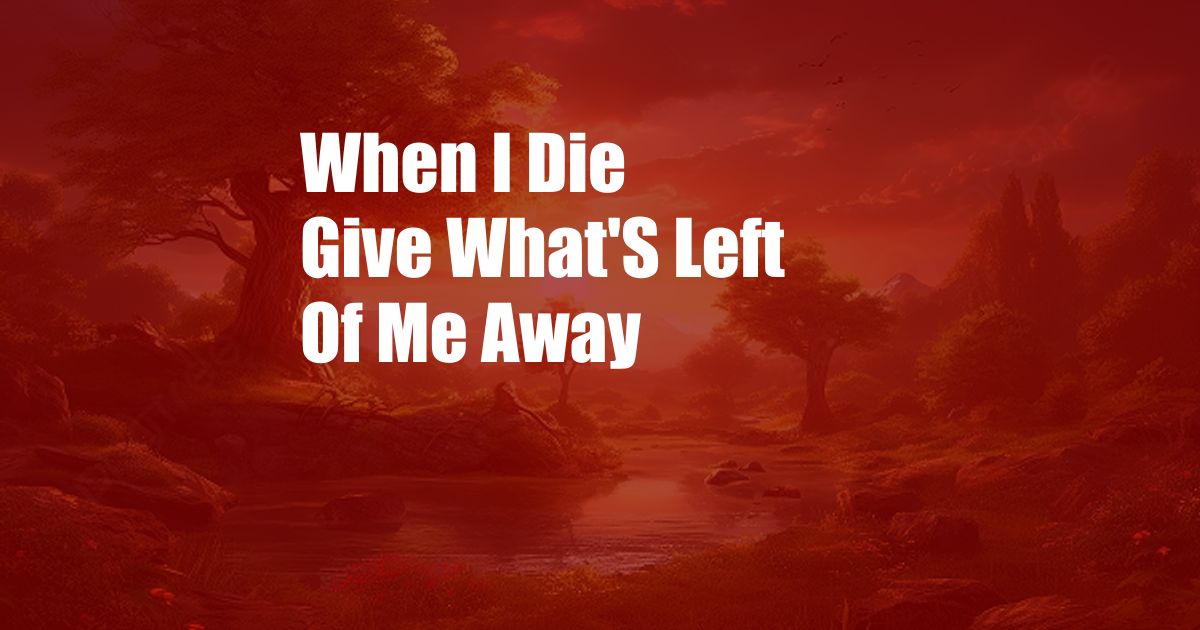
**When I Die, Give What’s Left of Me Away: A Deep Dive into the Meaning and Impact of Organ Donation**
In the twilight of my life, as the sun begins its final descent, I contemplate my earthly journey and the legacy I leave behind. The possessions I’ve accumulated over the years—the trinkets, the wealth, the material goods—will soon become obsolete. But there is an eternal gift I can bestow, a selfless act that will transcend my physical form: the donation of my organs.
Organ donation is a profound act of compassion, a testament to our shared humanity. It is the ultimate act of giving, a final gesture of love that can offer a glimmer of hope to those languishing on the brink of despair. By donating our organs, we can grant others a second chance at life, a chance to experience the joys and wonders of a world they were once teetering on the precipice of leaving.
**The Essence of Organ Donation: A Gift of Life**
Organ donation is the process of giving one’s organs after death for transplantation into individuals suffering from severe organ failure. Organs such as the heart, lungs, liver, kidneys, and pancreas can be donated, providing a lifeline to those whose own organs are failing.
The need for organ donation is immense. In the United States alone, over 100,000 people are waiting for a lifesaving organ, and sadly, many will not receive one in time. Organ donation has the power to transform lives, to alleviate suffering, and to restore hope to those who have lost all else.
**The History and Evolution of Organ Donation**
As far back as the 16th century, there were records of surgeons attempting to transplant tissues between animals. However, it wasn’t until the 20th century that successful organ transplants became possible.
The first successful kidney transplant was performed in 1954, ushering in a new era of medical advancements that would save countless lives. Over the years, organ transplantation techniques have become increasingly refined, and today, thousands of organ transplants are performed annually, offering hope to those who would otherwise have none.
**The Medical and Ethical Considerations of Organ Donation**
Organ donation is a complex process involving both medical and ethical considerations. Medically, it is crucial to ensure that organs are viable for transplantation and that they will be compatible with the recipient.
Ethically, organ donation raises questions about consent, autonomy, and the allocation of scarce resources. It is essential that organ donation is fully informed, voluntary, and respectful of the wishes of both the donor and the recipient. Additionally, the process of allocating organs is meticulously regulated to ensure fairness and transparency.
**Current Trends and Developments in Organ Donation**
The field of organ donation is constantly evolving, with ongoing research and advancements striving to improve outcomes and increase availability.
- Expanded criteria donation: Using organs from donors who do not meet traditional criteria, such as those with older or higher-risk organs.
- Tissue engineering and bioprinting: Developing artificial organs or growing replacement tissues to reduce the reliance on deceased donors.
- Increased public awareness: Campaigns and initiatives to promote understanding and encourage organ donation.
**Tips for Becoming an Organ Donor**
If you are considering becoming an organ donor, here are a few tips:
- Register your decision: Make sure your decision to donate is documented in your medical records or through an organ donor registry.
- Communicate your wishes: Share your decision with your family and friends, as they will be involved in the donation process upon your passing.
- Consider living donation: In some cases, it is possible to donate an organ while still living, such as a kidney or a portion of the liver.
**Benefits of Organ Donation**
Becoming an organ donor offers numerous benefits, both personal and societal:
- Gift of life: Organ donation has the potential to save and transform the lives of others.
- Personal legacy: It is a profound act that leaves a lasting legacy of compassion and altruism.
- Enhanced empathy: It can foster a deeper understanding of the fragility of life and the importance of helping others.
**FAQs on Organ Donation**
- Q: Can anyone be an organ donor?
- A: Most people can be organ donors, regardless of age or medical history. However, there are certain medical conditions that may preclude donation.
- Q: Are organ donations anonymous?
- A: In most cases, the identities of donors and recipients are kept confidential. However, some living donors and recipients may choose to meet and establish a connection.
- Q: Who can receive an organ transplant?
- A: Organs are allocated to recipients based on a number of factors, including medical urgency, compatibility, and geographic location.
- Q: How can I learn more about organ donation?
- A: There are numerous resources available to learn more about organ donation, including government websites, non-profit organizations, and hospitals.
**Conclusion: A Call to Compassion and Generosity**
In the twilight of our earthly sojourn, let us not be defined solely by the material possessions we leave behind, but by the lives we have touched and the difference we have made in the world.
By becoming an organ donor, we can leave an enduring legacy of hope, compassion, and love. We can give what’s left of ourselves, not to the cold earth, but to those who desperately need a reason to continue living.
I urge you to consider becoming an organ donor. Together, let us create a world where the bonds of humanity transcend our physical existence, a world where even in death, we can continue to give life.
Are you interested in learning more about organ donation? Do you have any questions or thoughts you would like to share?